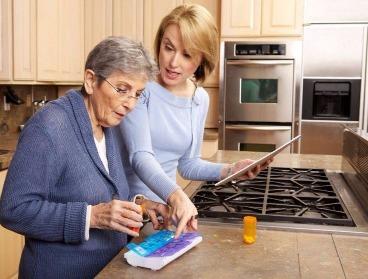TOP TEN TIPS TO MANAGE YOUR MEDICATIONS
 What’s in your medicine cabinet?
What’s in your medicine cabinet?
With so many Seniors and older adults taking different medications for multiple medical conditions and chronic pain, the potential for drug-related problems is increasing. Managing your medications, or those of a loved one, becomes especially important to avoid adverse side effects, interactions with other medications, duplication of drugs, and even overdose. Remember that as we age the metabolism slows, which makes Seniors more sensitive to the harmful side effects of certain substances. In this case, overdose could be serious or life threatening!
No matter what your age, you can easily mix up your meds if you have too many to take, the timing is hard to keep track of, you don’t recognize the names on the labels or can’t read them, or have trouble remembering what the drugs are for.
Be pro-active and check with your pharmacist or physician beforehand regarding the risks of certain medications in relation to the benefits, especially if other treatments are available, or you already take several prescribed medications or over-the-counter drugs and supplements. Do not self-medicate or over medicate, because more is not always necessarily better. Mixing meds can be dangerous, so learn about toxic interactions of drugs by reading the prescription inserts. Do not dismiss side effects and report them promptly. Do not take medications for long periods of time without re-evaluation by your doctor. Find out up front if any tests or monitoring will be required while you are taking the medication.
already take several prescribed medications or over-the-counter drugs and supplements. Do not self-medicate or over medicate, because more is not always necessarily better. Mixing meds can be dangerous, so learn about toxic interactions of drugs by reading the prescription inserts. Do not dismiss side effects and report them promptly. Do not take medications for long periods of time without re-evaluation by your doctor. Find out up front if any tests or monitoring will be required while you are taking the medication.
In the case of complex medical conditions, it can be dangerous to take a drug at the wrong time, or take too much, or in the wrong combination with another drug. A smart system is to keep all your medicine in one convenient location, in the original container or bottle, count your pills and take a regular inventory often to be sure doses don’t go missing (or extras aren’t being ingested). Other Senior smart strategies include:
- Start using a daily/weekly pill box organizer, especially if you take multiple medications multiple times a day;
- Create a daily checklist so that each dose can be marked off when taken – you now have a record and don’t have to rely on memory;
- Be sure to follow the prescription instructions as to dosage and time of day to be taken, don’t abuse “as needed;”
- Try using an alarm on the wrist watch, home clock, or cell phone as a medication administering alert;
- Ask if the prescription should be taken with or without food, if not indicated on the label, and if there are food restrictions;
- Avoid alcohol altogether when taking any medication;
- Do not break, crush, or chew tablets without first asking the doctor or pharmacist - if you have difficulty with tablets, ask if a liquid version of the drug is available;
- Check expiration dates – do NOT take expired medications or drugs if they have changed color, smell funny, etc.;
- Do not share medications with friends or family, and keep them stored securely to discourage abuse by others in the household;
- When traveling, hold onto your prescription items in case your luggage is stolen or lost.
Make sure your physician specialists consult with each other, as well as with your primary care doctor, regarding prescriptions. If you have questions or concerns about the medications you are taking, don’t be afraid to ask your doctor or pharmacist, especially if toxic interactions with other prescriptions are possible or if you are experiencing side effects. If you or a Senior loved one are having trouble administering or keeping track of the medicines you are being prescribed, homecare assistance might be beneficial. Additional educational resources are available online at: http://www.fda.gov/Drugs/.
Till Next Time!
Irv Seldin, JD, President and Owner, Visiting Angels of the Palm Beaches
This article is not intended as medical, legal, or financial advice.
